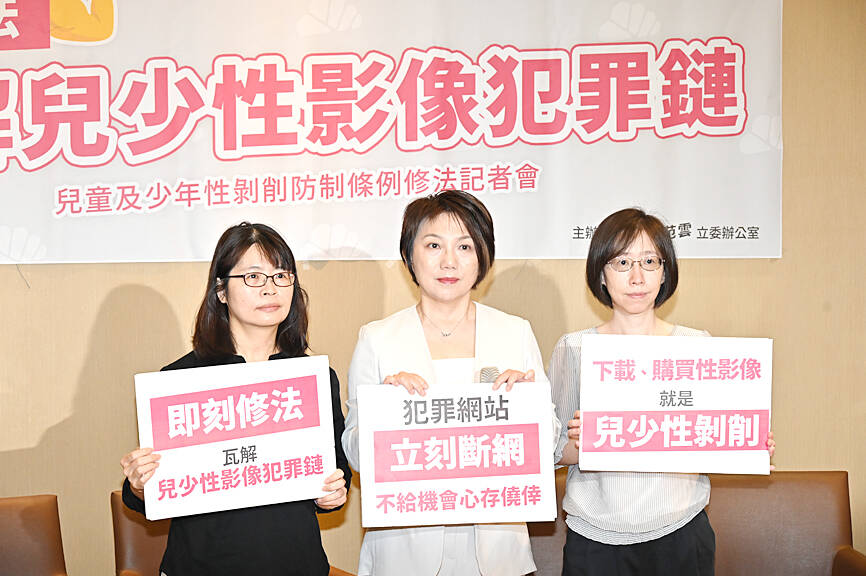Women’s rights groups and a Democratic Progressive Party (DPP) legislator yesterday called for the law to be changed to criminalize paying to watch, purchase or download sexual images featuring children, and implement harsher penalties for people who not only possess such images but also disseminate victims’ personal information.
During prosecutors’ investigation into sexual harassment accusations against entertainer Mickey Huang (黃子佼), he was found to possess seven sex videos featuring a minor, but was last month granted a deferred prosecution for two years, which sparked public outrage and resulted in prosecutors re-examining the case.
Since then, legislators across party lines have proposed amendments to revise the Child and Youth Sexual Exploitation Prevention Act (兒童及少年性剝削防制條例), stressing zero tolerance for the sexual exploitation of children and tougher penalties.

Photo: Tu Chien-jung, Taipei Times
DPP Legislator Fan Yun (范雲) and members of ECPAT Taiwan, Taipei Women’s Rescue Foundation and the Garden of Hope Foundation held a news conference at the Legislative Yuan in Taipei, calling for four main issues to be addressed in amendments.
While laws were amended last year to impose heavier penalties on perpetrators who produce or disseminate sexually exploitative images, and to order Web sites to remove the images within 24 hours, perpetrators continue to flaunt the law, Fan said.
More should be done to deter the people paying for such images, who should also be considered perpetrators, she said.
First, lawmakers should revise the law to criminalize paying to watch, purchase and download sexual images of children and youths, she said.
Second, perpetrators who not only possess such images but also disseminate the victims’ personal information should receive stiffer penalties.
Third, government agencies’ authority to shut down Web sites hosting sexually exploitative images should be enhanced, and fourth, the perpetrators should receive more hours of mandatory rehabilitation — at least eight, Fan said.
In addition to filming and spreading sexually exploitative images, some perpetrators also collect and sell the victim’s personal information, creating more safety risks and further harming victims, she said, adding that such perpetrators should receive a penalty that is 1.5 times harsher than the base sentencing.
The government should establish a special task force of prosecutors and police, as well as a cross-ministerial online sex crime prevention center, while the procedures for blocking a Web site should be simplified to speed up the removal of sexually exploitative content, Garden of Hope Foundation executive director Wang Yue-hao (王玥好) said.
Sexual grooming of children or youths should also be considered criminal behavior, as perpetrators could establish connections with a minor online and lower their inhibitions with the objective of sextortion or abuse, which should be deterred before the minor becomes a victim, ECPAT Taiwan secretary-general Chen I-ling (陳逸玲) said.
During a meeting at the Legislative Yuan’s Social Welfare and Environmental Hygiene Committee to review proposed amendments, committee convener Chinese Nationalist Party (KMT) Legislator Alicia Wang (王育敏) said that as all parties have agreed to amend the act as soon as possible, they aim to finish the preliminary review by tomorrow and send it out for the general assembly’s cross-party negotiation this week.

Beijing could eventually see a full amphibious invasion of Taiwan as the only "prudent" way to bring about unification, the US Department of Defense said in a newly released annual report to Congress. The Pentagon's "Annual Report to Congress: Military and Security Developments Involving the People's Republic of China 2025," was in many ways similar to last year’s report but reorganized the analysis of the options China has to take over Taiwan. Generally, according to the report, Chinese leaders view the People's Liberation Army's (PLA) capabilities for a Taiwan campaign as improving, but they remain uncertain about its readiness to successfully seize

Taiwan is getting a day off on Christmas for the first time in 25 years. The change comes after opposition parties passed a law earlier this year to add or restore five public holidays, including Constitution Day, which falls on today, Dec. 25. The day marks the 1947 adoption of the constitution of the Republic of China, as the government in Taipei is formally known. Back then the Chinese Nationalist Party (KMT) governed China from Nanjing. When the KMT, now an opposition party in Taiwan, passed the legislation on holidays, it said that they would help “commemorate the history of national development.” That

Taiwan has overtaken South Korea this year in per capita income for the first time in 23 years, IMF data showed. Per capita income is a nation’s GDP divided by the total population, used to compare average wealth levels across countries. Taiwan also beat Japan this year on per capita income, after surpassing it for the first time last year, US magazine Newsweek reported yesterday. Across Asia, Taiwan ranked fourth for per capita income at US$37,827 this year due to sustained economic growth, the report said. In the top three spots were Singapore, Macau and Hong Kong, it said. South

Snow fell on Yushan (Jade Mountain, 玉山) yesterday morning as a continental cold air mass sent temperatures below freezing on Taiwan’s tallest peak, the Central Weather Administration (CWA) said. Snowflakes were seen on Yushan’s north peak from 6:28am to 6:38am, but they did not fully cover the ground and no accumulation was recorded, the CWA said. As of 7:42am, the lowest temperature recorded across Taiwan was minus-5.5°C at Yushan’s Fengkou observatory and minus-4.7°C at the Yushan observatory, CWA data showed. On Hehuanshan (合歡山) in Nantou County, a low of 1.3°C was recorded at 6:39pm, when ice pellets fell at Songsyue Lodge (松雪樓), a